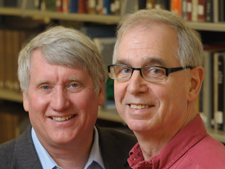Lincoln Hall Project

Former students Alan Burnham (PhD ’77, chemistry) and Terry Balle (PhD ’80, chemistry) discuss the life and untimely death of promising chemistry professor Willis ‘Bill’ Flygare
Alan Burnham: We also had basketball games weekly with Peter Beak and Bill Pirkle's group.
Terry Balle: That's right. I remember playing on that basketball game. I don't think any of the other professors in physical chemistry did that.
Burnham: No. Beak and Pirkle were organic.
Balle: Yeah, they were organic. But the competition was fierce. I remember being so involved in those games. We would really just kill each other.
Burnham: (laughs) Yeah. I would often twist my ankle. I would go home asking for sympathy from my wife. She never gave me any sympathy. But it really gave the character of Bill [Flygare]. He was a very intense, very competitive person, both in sports and in science.
Balle: Yeah. But to me it was somehow just sort of the fact that we…It was like a family. It was really like a family. And, to me, it contributed so much to wanting to be there and wanting to do the research and wanting to do the best you could possibly do.
Burnham: Yes. I felt that he had a good knack for bringing out the best in people. But you did have to want to work.
Balle: Yeah. Yeah. And I remember I think easily six days a week, sometimes seven days a week, I don't remember doing almost hardly anything else but going into the lab. It was like a complete dedication. It was sort of hard on the family life. But, to me, I would almost rather be in the lab than at any other place.
Burnham: Well, we had had a child when I was about a year from graduation. So I did, in fact, have a bit more family life perhaps.
Balle: Sure, you'd have to. Sure. Of course.
Burnham: But it was a great experience. People talk about the fact that in graduate school you usually have very little money, you're sort of subsistence living. But it's still a great time. I wouldn’t trade it for anything.
Balle: Oh yeah. No, I wouldn't trade it for anything either. And I think because of that, sometimes professors are all in their head. Whereas Bill [Flygare], you had a sense that he was much more of a man. He was like a complete human being, and he had feelings. So it was much more rounded an experience than just complete intellectual pursuit.
Burnham: Yeah. As you say, we developed very close relationships. I know that when he got sick, that it was kind of hard to believe and hard to take. His death affected me almost like a father.
Balle: Yeah. Me too. In fact, I remember, it was just he and I in the lab one day. When it first started to affect him, it first came into his hand. I remember he was going to write something down on a piece of paper for me. And he had a hard time holding the pen and writing. And I think it was before he had said anything to the group. And I said, “What’s going on with your hand?” And he said then to me that he had ALS. And I just couldn’t believe it. It was really sad. And I was just right in the middle of finishing up—it was about 1980 about then, or ’79, ’80 in that time frame—and it was just when we were having all these wonderful results from the spectrometer we had built. It was so kind of cruel to have this wonderful success and yet this onset of this illness.

(Length: 4:23)